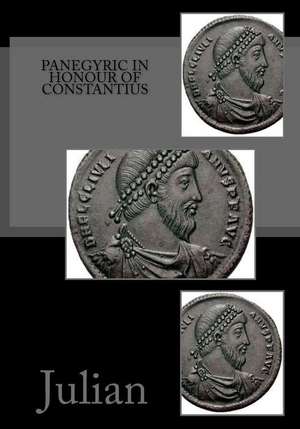Panegyric in Honour of Constantius
Autor Julianen Limba Engleză Paperback
Preț: 69.96 lei
Nou
Puncte Express: 105
Preț estimativ în valută:
13.39€ • 13.90$ • 11.16£
13.39€ • 13.90$ • 11.16£
Carte indisponibilă temporar
Doresc să fiu notificat când acest titlu va fi disponibil:
Se trimite...
Preluare comenzi: 021 569.72.76
Specificații
ISBN-13: 9781517179779
ISBN-10: 1517179777
Pagini: 38
Dimensiuni: 178 x 254 x 2 mm
Greutate: 0.09 kg
Editura: CREATESPACE
ISBN-10: 1517179777
Pagini: 38
Dimensiuni: 178 x 254 x 2 mm
Greutate: 0.09 kg
Editura: CREATESPACE
